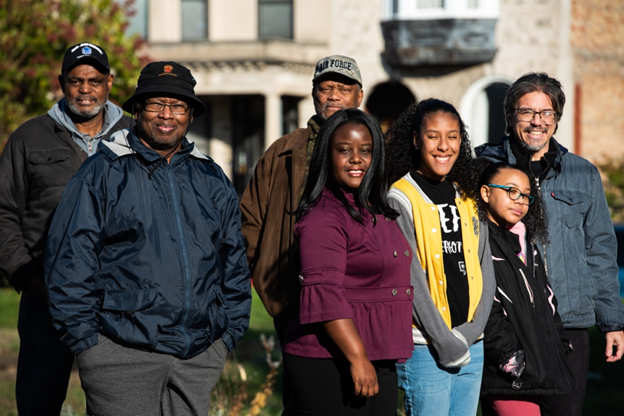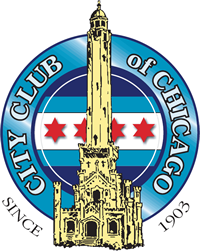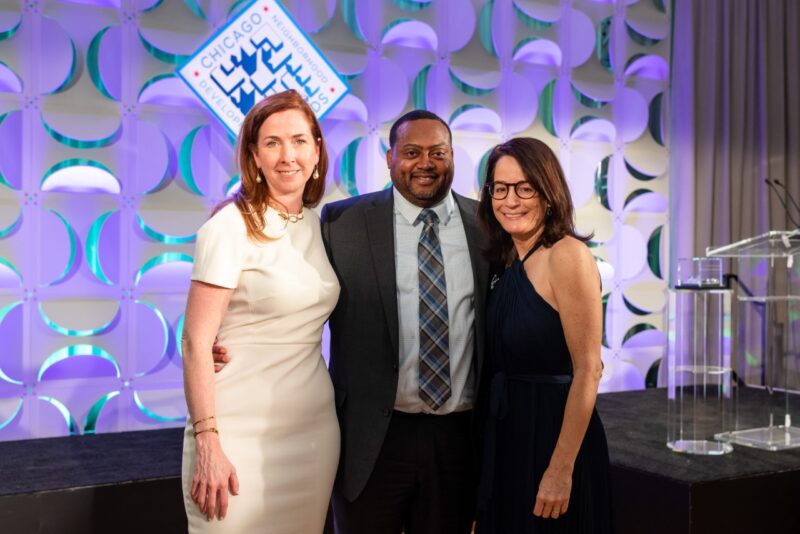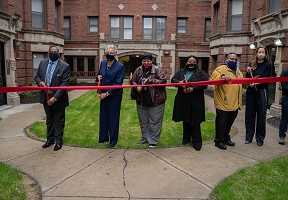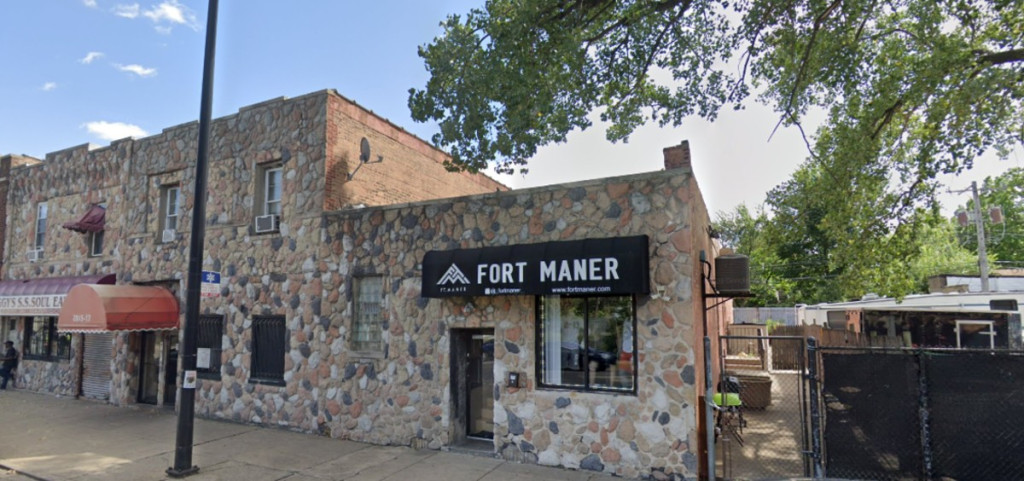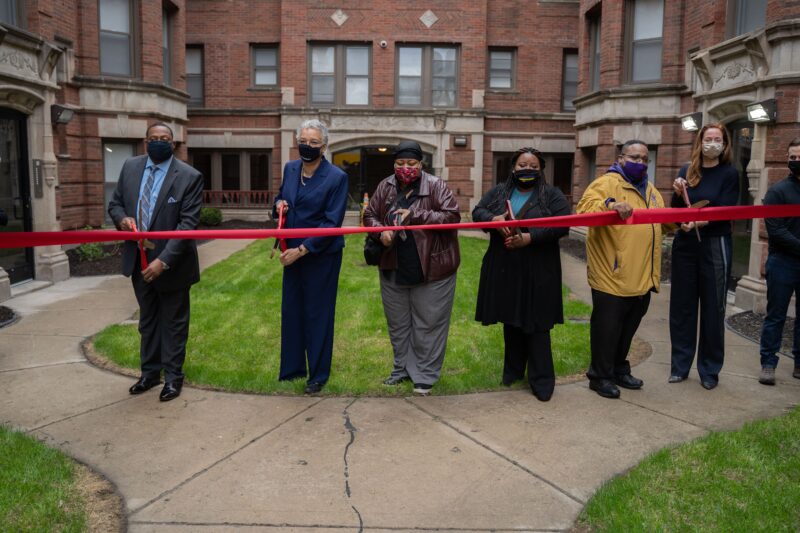A Bronzeville Family Is Creating A Community Garden To Share Their Love Of Their New Neighborhood
By Sara Badilini, Block Club Chicago | November 8th, 2021 (Click Here for Original Article)
BRONZEVILLE — Sythera Pride-Paulus and her family moved to Bronzeville in 2018 — but “it feels like we’d lived here forever,” she said.
The family — Sythera and her husband, J.P. Paulus; and their daughters, Mia and Faith Paulus — felt so welcomed in the neighborhood they immediately decided to buy a vacant lot adjacent to their home and transform it into a community garden. It took longer than expected due to some pandemic delays, but the major part of the work finished up in October, J.P. Paulus said.
Along the way, they’ve gotten inspiration and help from their neighbors.
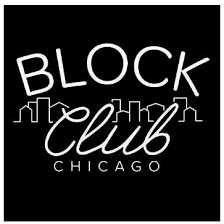 The Paulus family bought the lot through the Cook County Land Bank Authority, an agency born in 2013 in response to the large amount of vacant lots around the city following the housing crisis. The land bank makes it easier for people to buy the properties by “clearing the tax, clearing the title,” said county Commissioner Bridget Gainer.
The Paulus family bought the lot through the Cook County Land Bank Authority, an agency born in 2013 in response to the large amount of vacant lots around the city following the housing crisis. The land bank makes it easier for people to buy the properties by “clearing the tax, clearing the title,” said county Commissioner Bridget Gainer.
The land bank now has more than 550 small developers — most of them Black or Latino — who bought properties to create community gardens, residential units and other projects, Gainer said.
“Most of all, we realized that there was a huge number of people that were interested in redeveloping communities,” she said.
The Pride-Paulus family is among them.
“We moved to the neighborhood and immediately walked to [the land bank] to put down the application with the design for the garden extension,” Pride-Paulus said.
Their community garden, which will open in the spring at 440 E. 46th St., is an extension of a larger community garden that was built in 2011 across the street. That bigger garden was also built in a vacant lot; besides being a space for growing tomatoes, cucumbers and cabbage, it has hosted several community events.
Arnold McBlackwell and his brother, Emile McBlackwell, take care of the larger garden full time, but they are supported by a block club of around 20 people. They have concerts, barbecues, movie nights, yoga classes and Juneteenth celebrations.
Everyone in the community can come and pick whatever they want, and “the only rule is to always leave something to someone else,” said Arnold McBlackwell.
The garden also gives neighborhood children a chance to learn how to grow plants, he said.
“My granddaughter always says that watching the plants grow gives you the confidence in your own growth,” Arnold McBlackwell said.
It was that garden’s work that inspired the Pride-Paulus family.
“The community garden was our true inspiration,” J.P. Paulus said. “We wanted to share healthy fruit and vegetables with our neighbors and share a sense of community with everyone.”
The neighbors from the bigger garden are helping the Pride-Paulus family learn lawn maintenance and gardening.
“None of us has any previous knowledge about gardening,” Pride-Paulus said. “But everyone is helping and supporting us.”
In the spring, the family will start planting. They’ve received several requests from their neighbors: cilantro, cauliflowers, broccoli, carrots. And strawberries — for their daughters, Paulus said.
The local Girls Scouts already reached out, and they’ll help during the planting process, Pride-Paulus said.
“A garden is a sign of new life, and it gives people new ideas,” Gainer said. People can see that it’s an option, “and they also see that it’s not it doesn’t require the city, or a foundation, or somebody from the outside. It’s only done with the people in the neighborhood.”
CITY CLUB OF CHICAGO | ELEANOR GORSKI
City Club of Chicago | April 6th, 2022 (Click Here for Original Article)
After progressing in a series of leadership roles in City government, Eleanor Esser Gorski was appointed Executive Director of the Cook County Land Bank Authority (CCLBA) in August 2021. Gorski brings more than 25 years of planning, design and economic development experience to the CCLBA as it embarks on plans to expand its inventory to create more affordable housing and economic opportunity partnerships within Cook County. The Cook County Land Bank works to efficiently return vacant properties to productive use in underserved communities throughout the county by partnering with community developers, small business owners and prospective homebuyers. It is the largest land bank by geography in the country, with a current inventory of more than 1,700 properties.
 Before leading the CCLBA, Gorski served as Director of Design and Planning for the University of Illinois at Chicago. From 2019 to 2020, Gorski led the City of Chicago Department of Planning and Development (DPD) as First Deputy Commissioner and Acting Commissioner. Prior to this role, Gorski led the Bureau of Planning and Design for DPD, leading work on the City’s Industrial Corridor Modernization Initiative and the Fulton Market Innovation District Plan, creating the fastest-growing commercial sector in the city. Gorski has held many other leadership roles within the City, including director of the Landmarks Commission for five years. Projects she has managed include the five-year renovation of Wrigley Field, the planning for the Obama Presidential Center, the renovation of most of the early skyscrapers in the Loop as well as the preservation of the Carson Pirie Scott State Street store (now Target).
Before leading the CCLBA, Gorski served as Director of Design and Planning for the University of Illinois at Chicago. From 2019 to 2020, Gorski led the City of Chicago Department of Planning and Development (DPD) as First Deputy Commissioner and Acting Commissioner. Prior to this role, Gorski led the Bureau of Planning and Design for DPD, leading work on the City’s Industrial Corridor Modernization Initiative and the Fulton Market Innovation District Plan, creating the fastest-growing commercial sector in the city. Gorski has held many other leadership roles within the City, including director of the Landmarks Commission for five years. Projects she has managed include the five-year renovation of Wrigley Field, the planning for the Obama Presidential Center, the renovation of most of the early skyscrapers in the Loop as well as the preservation of the Carson Pirie Scott State Street store (now Target).
A hallmark of Gorski’s work is the way it centers equity and community, integrating design, planning and historic preservation. Notable projects include the creation of a community review process for the Chicago Plan Commission and numerous design guidelines for city landmark districts and neighborhoods. Her work in financial incentive legislation provided groundbreaking assistance for small businesses in communities of need through the Neighborhood Opportunity Fund and helped to preserve landmarks with the Class L tax incentive.
Gorski is a licensed architect with degrees in architecture, art history and history. She is a fellow of the American Academy of Rome, where she studied the integration of new construction and old in Rome, Berlin and Amsterdam. She is also a fellow of the University of Chicago Civic Leadership Academy. Gorski sits on the Local Advisory Board of LISC Chicago, the alumni board of the University of Illinois School of Architecture and the Board of the Illinois Medical District. Most important, she is a proud mom to two teenage boys and lives in the City of Chicago.
COOK COUNTY LAND BANK AUTHORITY RECEIVES RICHARD M. DALEY FRIEND OF THE NEIGHBORHOODS AWARD AT LISC CHICAGO’S 27th ANNUAL CHICAGO NEIGHBORHOOD DEVELOPMENT AWARDS
CLICK HERE FOR OFFICIAL PRESS RELEASE
CHICAGO—LISC Chicago today announced that the Cook County Land Bank Authority (CCLBA) is this year’s recipient of the Richard M. Daley Friend of the Neighborhoods Award at the 27th Annual Chicago Neighborhood Development Awards (CNDA). The awards, which were held on Thursday, June 3, via a hybrid virtual and in-person event, honored top community development projects and architectural achievements across the city. The CCLBA joins a group of community development projects recognized by LISC for their investments in the economic and social vitality of neighborhoods across Chicago.
After the 2008 housing crisis, decades of redlining and the impacts of discriminatory housing policy exacerbated the devastation and cycle of abandonment in Cook County’s predominantly Black and Brown neighborhoods. Created in 2013 by Cook County Board President Toni Preckwinkle and Cook County Commissioner Bridget Gainer, the Land Bank reclaims, revitalizes and returns vacant and abandoned residential, industrial and commercial properties and lots back to productive, tax-paying use.
“At the Cook County Land Bank, we strive to be a friend to so many of Chicago’s great neighborhoods, like Auburn Gresham, Humboldt Park and Roseland,” said Rob Rose, Executive Director of the Cook County Land Bank Authority. “The Land Bank is devoted to accomplishing this work with the collaboration of local grassroots organizations, municipalities and community developers, and we have a shared long-term goal of building home ownership and wealth in the neighborhoods we serve.”
The CCLBA is geographically the nation’s largest land bank, working with local community developers in Chicago and throughout Cook County’s suburban neighborhoods to save and resurrect blighted properties that contribute to low property values and higher levels of crime.
In less than a decade, the Land Bank has acquired more than 2,000 properties, sold more than 1,000 and helped returned more than $14.5 million to the tax rolls. In Cook County, the Land Bank has generated more than $95 million in community wealth since its inception, disrupting decades of divestment and enabling small business owners to create sustainable change, as well as jobs that lead to greater stability, in their neighborhoods.
The full program can be viewed at www.lisc-cnda.org.

